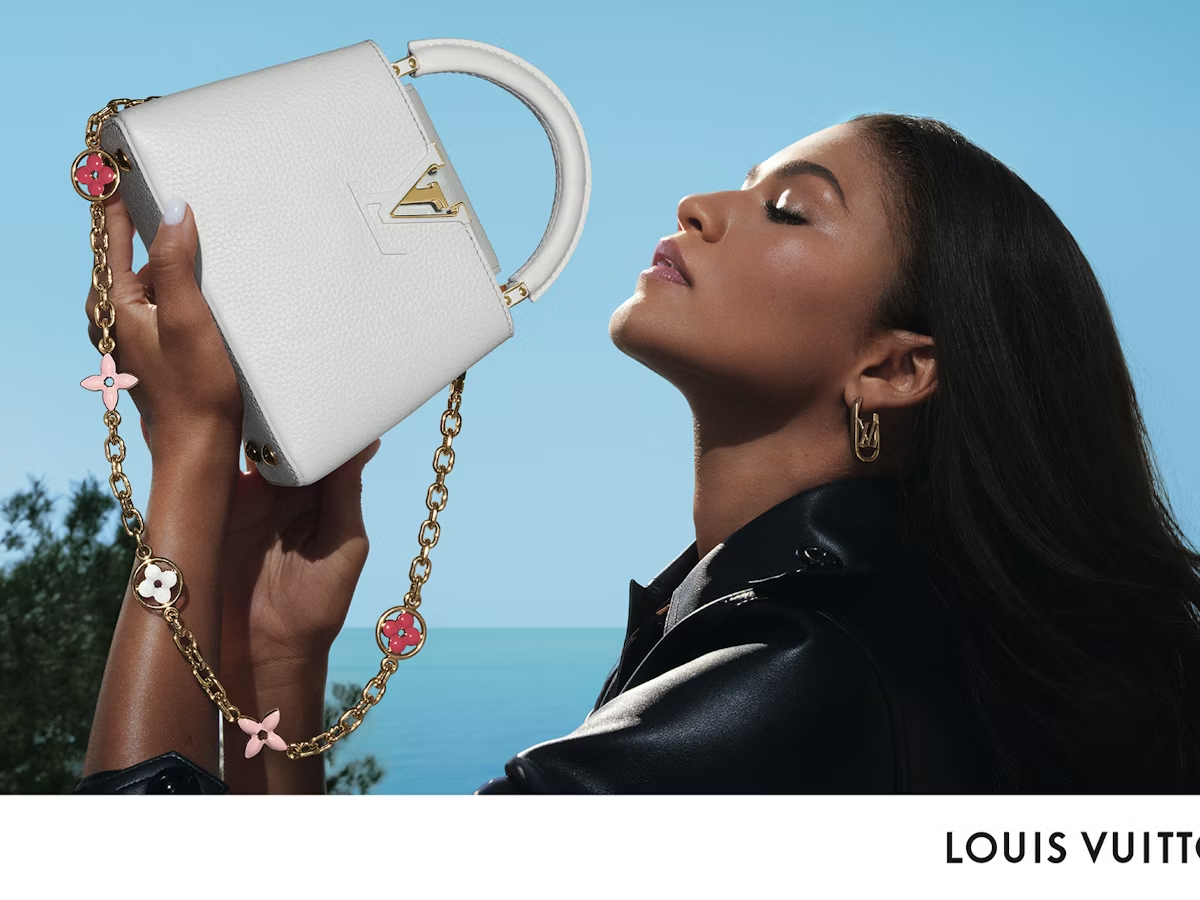Social media has become integral to our daily lives, shaping how we communicate, stay informed, and shop. For Generation Z (Gen Z), those born roughly between 1997 and 2012, the influence of social media platforms like TikTok and Instagram on their shopping habits is particularly profound. According to EMARKETER, 1-in-2 (nearly half) of Gen Zers use social media to identify the latest trends in luxury. This heavy reliance on social media is reflected in their luxury shopping behaviors, where authenticity and social impact are paramount.
Unlike previous generations, Gen Z-ers are less swayed by traditional advertising and more influenced by genuine connections and the perceived credibility of influencers. A staggering 97.5% of Gen Z cite social media as their primary source of shopping ideas, with 81% discovering new products and services through these platforms.
Platforms like TikTok, Instagram, Snapchat, and YouTube dominate Gen Z’s social media usage, offering visual, interactive, and short-lived content that resonates with their desire for creative expression and connection. Studies have shown that 70% of Gen Z consumers are highly influenced by social media influencers when making purchasing decisions, viewing them as trusted sources of information.
For instance, TikTok’s algorithm-driven content curation helps users stumble upon new luxury items, often leading to impulse purchases. According to Luth Research, 41% of people who purchase a product say they weren’t planning on buying it before encountering it online.
The impact of social media extends beyond mere product discovery. It also shapes Gen Z’s values and expectations from luxury brands. Sustainability and inclusivity have become critical factors in their purchasing decisions, with status and prestige taking a backseat. This shift is evident in the rise of the influencer ecosystem within the luxury and fashion sectors, where influencers who promote sustainable and inclusive practices gain more traction among Gen Z consumers.
We’ll delve into this phenomenon, exploring why social media holds such sway over Gen Z’s luxury shopping behaviors, its role in brand discovery and loyalty, and what this means for marketers aiming to capture the attention of this digitally native generation.
The Digital Natives’ Playground
The Rise of Social Commerce
Gen Z has grown up in an era of digital interaction. Unlike previous generations who witnessed the birth and evolution of the internet, Gen Z has never known a world without constant connectivity. Platforms like TikTok, Instagram, and Snapchat are not just social networks; they are multifaceted hubs where users can discover new products, interact with brands, and make purchases swiftly.
View this post on Instagram
Social commerce – buying and selling goods directly within social media platforms – has exploded in recent years. Gen Z’s preference for seamless shopping experiences is a leading driver of this trend. Integrating shopping features into platforms like Instagram Shopping and TikTok’s partnership with Shopify has made it easier than ever for Gen Zers to transition from browsing to buying without leaving their favorite apps.
Influencers as Trendsetters
@jillbadlotto Zendaya’s met gala looks over the years #fyp #foryoupage #zendaya #celebritytiktok #metgala #fashion #fashiontiktok #celebrity #greenscreen ♬ original sound – Jill Badlotto
In the world of luxury fashion, influencers wield significant power. They serve as modern-day trendsetters, providing Gen Z with a curated window into the world of high fashion. Influencers bridge the gap between aspirational luxury and attainable style by showcasing how high-end products can be incorporated into everyday wear.
For instance, micro-influencers with smaller but highly engaged followings often offer consumers a more authentic and relatable connection. Their honest reviews and personal endorsements resonate with Gen Z, who value transparency and authenticity. Influencers’ ability to humanize brands and present products in real-world contexts makes them instrumental in shaping luxury trends among their followers.
User-Generated Content and Peer Influence
@ciaraodohertyy Replying to @Julie Socials more of my favourite luxury handbags under €600 👜 I’ve been getting some questions about mid range and affordable luxury bags recently, so I hope this helps! Everything is linked in my bio ✨#poleneparis #demellierlondon #parisawang #songmont #songmontluna #quietluxury #oldmoneyaesthetic #luxurybag #luxurybags #fyp #foryoupage @polene_paris @Songmont_Official @DeMellier @BY FAR @Parisa Wang ♬ Jazz Bossa Nova – TOKYO Lonesome Blue
Beyond influencers, user-generated content (UGC) is another powerful tool in the social media landscape. Gen Z greatly values the opinions of their peers when making purchasing decisions. Platforms encourage users to share their experiences through posts, stories, and videos, creating a loop of community-driven content that organically perpetuates trends.
Seeing a peer or a relatable figure enjoying a luxury product adds a layer of trust and relatability that traditional advertising struggles to achieve. Encouraging and spotlighting UGC for luxury brands can foster a closer bond with young consumers, turning satisfied customers into brand advocates.
Discovering Luxury through Social Media
From Discovery to Purchase
@juliedeandrade The “ i told ya “ tshirt that Zendaya wore in the movie: Challengers is available for purchase! The tshirt was made by @LOEWE with reference from JFK Jr! . . #loewe #loeweshirt #itoldya #zendaya#zendayaedit #zenitsu #challengers #movietiktok #movierecommendation #fyp ♬ talking body speed up – 🎧
Due to social media, the path from trend discovery to purchase has become remarkably streamlined. When Gen Z members come across a luxury item that piques their interest—whether through an influencer’s post, a targeted ad, or a friend’s story—they can usually learn more about it instantly. Most platforms provide a seamless journey: Click on an image, view the product details, see related items, and proceed to check out—all within the same app.
Personalized Experiences
View this post on Instagram
One of social media’s strengths is its ability to offer personalized experiences. Algorithms continually refine what users see based on their interests and behaviors. For Gen Z, their social media feeds increasingly reflect their preferences, showing them the latest luxury trends that align with their tastes. This personalized exposure keeps them updated and enhances their engagement with brands.
Trends in Real-Time
The dynamic nature of social media allows trends to emerge and spread rapidly. A viral post can propel a luxury item into the must-have spotlight within hours. Gen Z thrives on this immediacy, enjoying discovering and embracing trends in real-time. They turn to social media to stay ahead of the curve, often driving demand for exclusive, limited-edition, or hard-to-find luxury goods.
Implications for Marketers
Building Authentic Connections
For marketers, reaching Gen Z requires more than flashy ads; it demands building authentic connections. Brands must authentically engage with Gen Z through genuine collaborations with respected influencers or by creating relatable, shareable content. Engagement must feel organic and align with Gen Z’s values and lifestyle.
@romy.nohra A look at the LOEWE Lamps. #milan #designweekmilano #designweek2024 #LOEWE #LOEWEsalone ♬ i like the way you kiss me – Artemas
LOEWE, mentioned in the context of iconic brands from the past, is a good example of how brands can remain relevant. Collaborating with contemporary influencers and integrating social commerce, LOEWE continues to appeal to younger audiences while maintaining its prestigious heritage.
Leveraging Data and Insights
Understanding Gen Z’s behaviors and preferences is critical. Marketers should leverage analytics tools to gather insights into what resonates most with this demographic. By studying interactions, likes, shares, comments, and UGC, brands can identify which luxury trends are gaining traction and tailor their strategies accordingly.
Encouraging User-Generated Content
@christinepadilla99 Replying to @johuff Not enough reviews out there on the Medium Jodie and I gotta say I love mine!!! – – #greenscreen #bottegaveneta #bottegajodiemedium #bottegajodie bottega jodie size comparison #bottegajodiereview #bottegavenetahandbags #designerbags #worthit #workbag #travelbag #everydaybag #jodiesizes #bottegavenetajodie #jodiebag #mediumjodiebag #luxuryreviews #luxuryhandbagreview #designerbags Bottega Veneta Jodie Medium Bottega Hobo Bag #hobobag #bottegahobobag ♬ original sound – CHRISTINE
As previously discussed, UGC can be a powerful ally. Brands should encourage customers to share their experiences, perhaps through specific hashtags or social media challenges. Featuring customer posts on official brand pages validates the contributors and builds a community around the brand.
Investing in the Right Platforms
Brands must invest in the social media platforms that Gen Z frequents most. While Instagram and TikTok are frontrunners, new platforms can quickly emerge and gain popularity. Staying current with the platforms that Gen Z uses ensures that brands remain visible where their target audience spends their time.
Focusing on Experience
@digitalfashion_arIf you think these looks are too “boring”, check the app — there are lots of creative designs from the community authors.♬ original sound – Digital Fashion
Gen Z places immense value on experiences. For luxury brands, creating immersive, memorable shopping experiences is crucial. Whether through augmented reality (AR) virtual try-ons, interactive live streams, or behind-the-scenes content, providing engaging and enriching experiences can foster a deeper connection with Gen Z consumers.
Conclusion
Social media’s role in shaping Gen Z’s discovery and adoption of luxury trends cannot be overstated. As digital natives, Gen Zers rely heavily on these platforms for inspiration, information, and shopping. The blend of influencer marketing, UGC, social commerce, and personalized experiences forms a powerful ecosystem that drives trend awareness and purchasing behavior. Authenticity, engagement, and innovation are fundamental, enabling brands to build lasting relationships with Gen Z consumers who will likely continue to shape the luxury market for years.

















